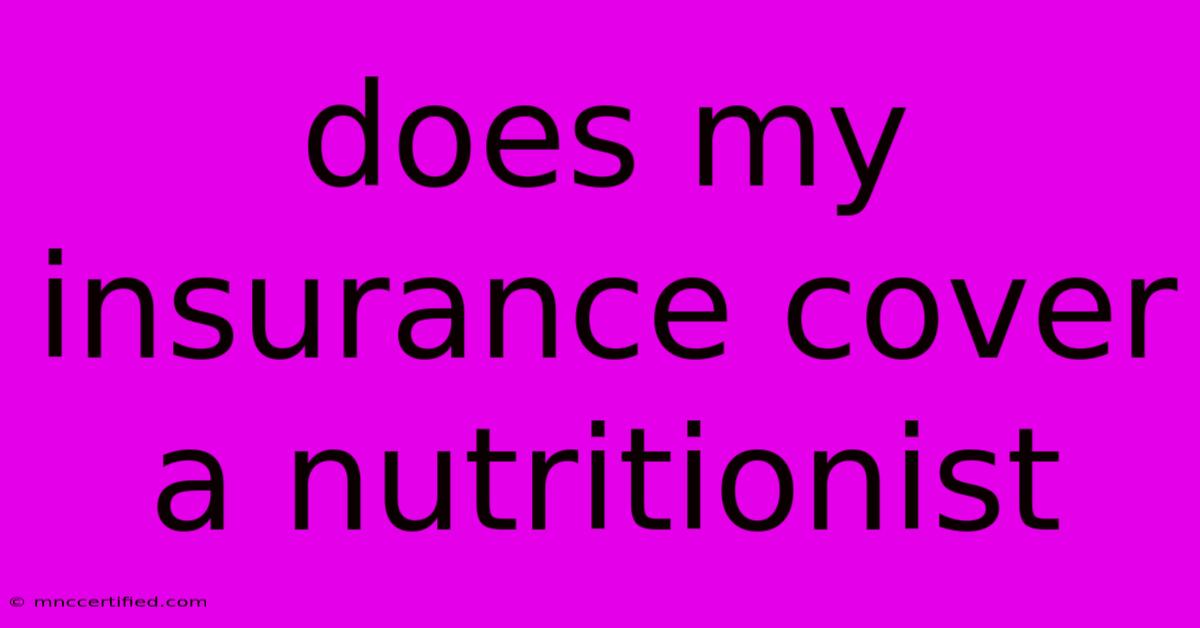Does My Insurance Cover A Nutritionist

Table of Contents
Does My Insurance Cover a Nutritionist? A Comprehensive Guide
Navigating the world of insurance can be confusing, and understanding what your plan covers can feel like deciphering a foreign language. Especially when it comes to something as personal as your health and nutrition, knowing if your insurance will cover visits to a registered dietitian or nutritionist is crucial.
The Short Answer:
The answer to whether your insurance covers a nutritionist is not a simple yes or no. It depends on several factors, including:
- Your insurance plan: Different insurance plans have varying levels of coverage for nutritionists.
- Your reason for seeing a nutritionist: Some plans cover nutrition counseling for specific medical conditions like diabetes or heart disease, while others may not.
- Your provider: Some insurance plans only cover visits with registered dietitians (RDs), who are qualified professionals with specific training and licensing.
Understanding the Difference: Registered Dietitians vs. Nutritionists
While the terms are often used interchangeably, there's a distinction:
- Registered Dietitians (RDs) are professionals who have completed a bachelor's degree in nutrition, completed an internship, and passed a national exam. They are legally qualified to provide nutrition counseling and are often the professionals covered by insurance.
- Nutritionists may have a background in nutrition but don't necessarily hold the same credentials as an RD. Their services may not be covered by insurance.
How to Find Out If Your Insurance Covers a Nutritionist:
1. Check Your Insurance Policy:
- Look for "Nutrition Counseling" or "Dietitian Services": Your policy may have a specific section outlining coverage for these services.
- Review your benefits: Pay close attention to the coverage limits, deductibles, and copayments associated with nutrition counseling.
2. Contact Your Insurance Provider:
- Call your insurance company directly: Ask about coverage for nutritionists or dietitians, outlining the reason for your potential visit.
- Provide your plan information: Include details about your insurance provider, plan name, and member ID.
3. Use Your Insurance Company's Website:
- Look for a "Find a Provider" feature: This tool might allow you to search for in-network nutritionists or dietitians.
- Check for FAQs or coverage information: Many insurance company websites provide detailed information about covered benefits and services.
Factors Influencing Coverage:
- Medical Necessity: If you have a pre-existing medical condition like diabetes, heart disease, or food allergies, your insurance may cover nutrition counseling as part of your treatment plan.
- Doctor Referral: Some insurance plans may require a referral from your primary care physician to cover nutrition counseling.
- State Regulations: Different states have varying laws regarding insurance coverage for nutrition services.
What if My Insurance Doesn't Cover a Nutritionist?
If your insurance doesn't cover nutrition services, consider these options:
- Out-of-Pocket Payment: You can choose to pay for the services out of pocket.
- Flexible Spending Account (FSA) or Health Savings Account (HSA): Funds from these accounts can be used for eligible medical expenses, including nutrition counseling.
- Negotiate Payment Plans: Some nutritionists may offer payment plans or sliding scale fees.
- Seek Free or Low-Cost Resources: Many community health centers, hospitals, and non-profit organizations offer nutrition counseling programs at reduced or free rates.
Don't Delay Seeking Professional Guidance:
If you're struggling with your diet, facing a health condition, or simply want to improve your overall well-being, don't hesitate to reach out to a qualified nutrition professional. Even if your insurance doesn't cover it, there may be affordable options available.
Remember: Your health is a priority, and investing in nutrition counseling can be a wise decision that contributes to your long-term well-being.

Thank you for visiting our website wich cover about Does My Insurance Cover A Nutritionist. We hope the information provided has been useful to you. Feel free to contact us if you have any questions or need further assistance. See you next time and dont miss to bookmark.
Featured Posts
-
How Much Is 50 Cent Euro In Us Dollars
Nov 09, 2024
-
How Can I Tell If I Have Gap Insurance
Nov 09, 2024
-
American Auto Insurance Company Claims
Nov 09, 2024
-
Freedom National Car Insurance Reviews
Nov 09, 2024
-
Mbappes France Decision Didier Deschamps Rift
Nov 09, 2024